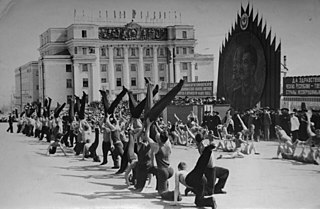
Mordvins is an official term used in the Russian Federation to refer both to Erzyas and Mokshas since 1928.
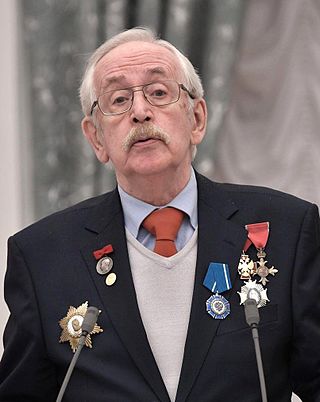
Vasily Borisovich Livanov, MBE, is a Soviet and Russian film actor, animation and film director, screenwriter and writer most famous for portraying Sherlock Holmes in the Soviet TV series. He was named People's Artist of the RSFSR in 1988.
Vitaly Mefodievich Solomin was a Soviet and Russian actor, director and screenwriter, best remembered for playing Dr. Watson in a series of Sherlock Holmes adaptations for Soviet television. He was the younger brother of Yury Solomin.

Leonid Vyacheslavovich Kuravlyov was a Soviet and Russian film actor. He became a People's Artist of the RSFSR in 1976.

Ivan Aleksandrovich Pyryev was a Soviet and Russian film director, screenwriter, actor and pedagogue remembered as the high priest of Stalinist cinema. He was awarded six Stalin Prizes, served as Director of the Mosfilm studios (1954–57) and was, for a time, the most influential man in the Soviet motion picture industry.

A troika is a traditional Russian harness driving combination, using three horses abreast, usually pulling a sleigh. It differs from most other three-horse combinations in that the horses are harnessed abreast. The middle horse is usually harnessed in a horse collar and shaft bow; the side horses are usually in breastcollar harness. The troika is traditionally driven so that the middle horse trots and the side horses canter; the right-hand horse will be on the right lead and the left-hand horse on the left lead. The troika is often claimed to be the world's only harness combination with different gaits of the horses.
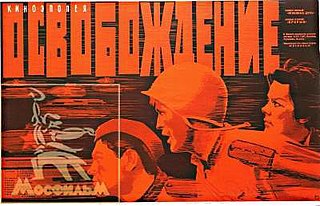
Liberation is a film series released in 1970 and 1971, directed by Yuri Ozerov and shot in wide-format NIKFI process (70 mm). The script was written by Yuri Bondarev and Oscar Kurganov. The series was a Soviet-Polish-East German-Italian-Yugoslav co-production.

Vladimir Makarovich Velichko is a Soviet official and entrepreneur appointed as the First Deputy Prime Minister of the Cabinet of Ministers in 1991.
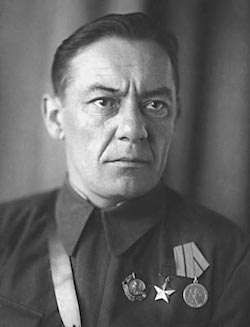
Vasil Ivanovich Kozlov was a Soviet Belarusian partisan and politician. Hero of the Soviet Union (1942).

Vasily Ivanovich Belov was a Soviet and Russian writer, poet and dramatist, who published more than sixty books which sold seven million copies. A prominent member of the influential 1970s–1980s derevenschiki movement, Belov's best known novels include Business as Usual, Eves, The Best is Yet to Come and The Year of a Major Breakdown.

Vasily Shalvovich Kvachantiradze was a top Soviet sniper during World War II. He is credited with confirmed kills numbering at least 215 officers and soldiers of the German Wehrmacht during the Vitebsk-Orsha Offensive and 542 confirmed kills total during the war.
![<i>There Is Such a Lad</i> 1964 [[Soviet Union]] film](https://upload.wikimedia.org/wikipedia/en/f/fa/There_Is_Such_a_Lad.jpg)
There Is Such a Lad is a 1964 Soviet romantic comedy film, directed by Vasily Shukshin. The movie is based on Vasily Shukshin's collection of short stories.

The Red Snowball Tree is a 1974 Soviet drama film written and directed by Vasily Shukshin. It was the most successful film of that year. In total, the film sold an estimated 140 million tickets at the Soviet box office, making it the highest-grossing Soviet film of all time. German film director and screenwriter Rainer Werner Fassbinder included The Red Snowball Tree in the top ten of his favorite films.

Sergei Petrovich Nikonenko is a Soviet and Russian actor, a film director and a screenwriter. He was awarded with People's Artist of the RSFSR (1991).

A Simple Story is a 1960 Soviet romantic drama film directed by Yuri Yegorov. The picture was the 48th most attended domestic film in the Soviet Union.
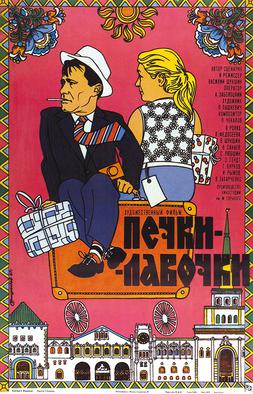
Happy Go Lucky is a 1972 Soviet comedy film directed by Vasily Shukshin.

Alyonka is a 1961 Soviet comedy film directed by Boris Barnet.

Srostki is a rural locality and the administrative center of Srostinsky selsoviet, Biysky District, Altai Krai, Russia. The population was 2,769 as of 2013. There are 30 streets.
Tatiana Godovalnikova is a Russian contemporary artist. Museums in Russia, Germany and Japan as well as private collectors in Israel, Poland, Great Britain, Germany and Switzerland have Godovalnikova’ s art. Her works are presented also at Sevastopol Art Museum and the State Museum of Heroic Defence and Liberation of Sevastopol. In 1992 she became a member of the Union of Artists of Russia and the International Association of Art – UNESCO.

Vasily Yevgenievich Stepanov is a Russian cinema critic, journalist, columnist; since 2020 — chief editor of Seans magazine.
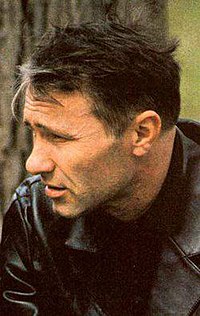










![<i>There Is Such a Lad</i> 1964 [[Soviet Union]] film](https://upload.wikimedia.org/wikipedia/en/f/fa/There_Is_Such_a_Lad.jpg)






